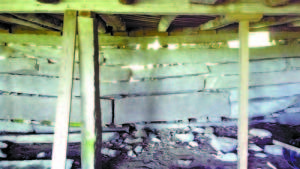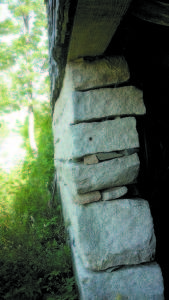Temperance Barn on shaky foundation

SOUTH FOUNDATION — The substantial gaps between the granite slabs and the large chinking stones illustrate the extent to which the foundation has sunk over the centuries.
Bridgton Historical Society has been advised that the barn at Narramissic, the Peabody-Fitch Farm in South Bridgton should be closed to the public until structural problems with the dry stone granite foundation can be addressed.
The Society has become increasingly aware that there were problems with the foundation, according to BHS Executive Director Ned Allen. It all started when volunteers made some repairs and adjustments to the door, which was getting very hard to open and close. They noticed that the real culprit wasn’t the door itself, but the fact that the structure had shifted off its foundations.
The Society consulted with several historic preservation consultants about the problems facing the 175-year-old foundation, and a recent report by Christopher Closs of Maine Preservation warned that the situation has reached the point where concern for public safety dictates the drastic action.
Allen said Society officials are in the process of "figuring out" how they will approach raising funds for the project.
"Although we obviously have some pressing issues to deal with immediately, this project will require more than sending out a few letters and holding a bean supper. We have to plan it carefully," Allen said. "I'm convinced that we will emerge from all of this in a few years as a much stronger organization."
The barn, approximately 40’x60’, was built in the 1830s by George Fitch, son-in-law of the house’s original owner, William Peabody. It is known locally as the “Temperance Barn,†since according to local tradition, it was raised during a period of religious revival, without the barrel of rum that was usually part of such occasions. Mr. Fitch was an ambitious builder, constructing this large barn next to an existing one. A few years later, he decided that it needed a cellar; he built a large wooden screw, lifted the barn up and built the foundation of huge granite slabs that he quarried from the hill behind the house. The barn has stood, through wind, rain, and sun and through good times and bad, since then.
The barn is featured prominently in Don Perkins recent book, The Barns of Maine, as it is a noteworthy specimen of a mid-19th century barn with a very compelling story. The barn has been used over the years as a venue for numerous events and programs, from scholarly lectures and fine artisans shows to community suppers and dances.

NORTH FOUNDATION — The north foundation is listing out of plumb approximately 5%, which suggests that the barn is migrating in that direction. According to the Maine Preservation report, “if this movement is allowed to continue, the barn will collapse in just a few short years.â€
But, no barn — or other historic structure — stands forever without repairs. It was re-sided in the late 1930s after Margaret Monroe purchased the property, and the society has worked over the years at preserving the structure, most recently by replacing the roof. Major work was also undertaken when the farm was donated to the Society in 1987. The floor was replaced at that time, and structural repairs straightened the barn and reinforced the supporting posts. Those repairs have lasted for a quarter of a century, but 25 years of water draining off the Fitch’s Hill has taken its toll, washing out the soil under the foundation.
The Society will be consulting with experts to plan the restoration, which will involve lifting the structure, rebuilding the foundation, and creating a drainage system that will siphon water away from the structure. A temporary bracing system will be devised so that the barn can be safely used during the restoration process, which is likely to take place in phases over the course of several years.
The house remains open for tours, and is open for the rest of the season on Wednesdays from 11 a.m. to 3 p.m.
The Bridgton Historical Society also operates an archives and museum in the former fire station on Gibbs Avenue in downtown Bridgton, which currently features an exhibit on the Bridgton During the Civil War.
For further information contact the Bridgton Historical Society at PO Box 44, Bridgton, ME 04009 or call 647-3699, visit the website at www.bridgtonhistory.org or e-mail info@bridgtonhistory.org

